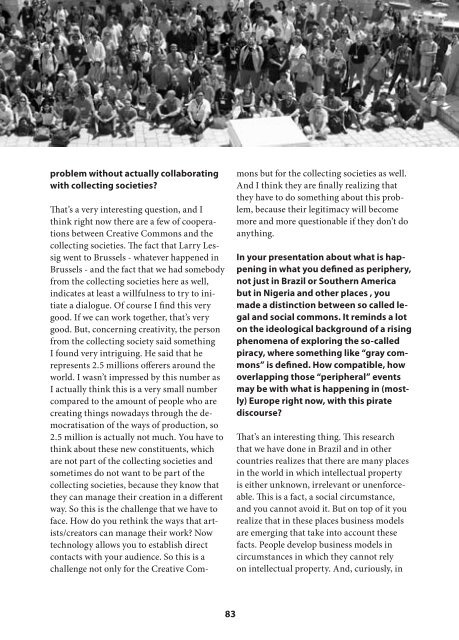Create successful ePaper yourself
Turn your PDF publications into a flip-book with our unique Google optimized e-Paper software.
problem without actually collaborating<br />
with collecting societies?<br />
That’s a very interesting question, and I<br />
think right now there are a few of cooperations<br />
between Creative Commons and the<br />
collecting societies. The fact that Larry Lessig<br />
went to Brussels - whatever happened in<br />
Brussels - and the fact that we had somebody<br />
from the collecting societies here as well,<br />
indicates at least a willfulness to try to initiate<br />
a dialogue. Of course I find this very<br />
good. If we can work together, that’s very<br />
good. But, concerning creativity, the person<br />
from the collecting society said something<br />
I found very intriguing. He said that he<br />
represents 2.5 millions offerers around the<br />
world. I wasn’t impressed by this number as<br />
I actually think this is a very small number<br />
compared to the amount of people who are<br />
creating things nowadays through the democratisation<br />
of the ways of production, so<br />
2.5 million is actually not much. You have to<br />
think about these new constituents, which<br />
are not part of the collecting societies and<br />
sometimes do not want to be part of the<br />
collecting societies, because they know that<br />
they can manage their creation in a different<br />
way. So this is the challenge that we have to<br />
face. How do you rethink the ways that artists/creators<br />
can manage their work? Now<br />
technology allows you to establish direct<br />
contacts with your audience. So this is a<br />
challenge not only for the Creative Com-<br />
83<br />
mons but for the collecting societies as well.<br />
And I think they are finally realizing that<br />
they have to do something about this problem,<br />
because their legitimacy will become<br />
more and more questionable if they don’t do<br />
anything.<br />
In your presentation about what is happening<br />
in what you defined as periphery,<br />
not just in Brazil or Southern America<br />
but in Nigeria and other places , you<br />
made a distinction between so called legal<br />
and social commons. It reminds a lot<br />
on the ideological background of a rising<br />
phenomena of exploring the so-called<br />
piracy, where something like “gray commons”<br />
is defined. How compatible, how<br />
overlapping those “peripheral” events<br />
may be with what is happening in (mostly)<br />
Europe right now, with this pirate<br />
discourse?<br />
That’s an interesting thing. This research<br />
that we have done in Brazil and in other<br />
countries realizes that there are many places<br />
in the world in which intellectual property<br />
is either unknown, irrelevant or unenforceable.<br />
This is a fact, a social circumstance,<br />
and you cannot avoid it. But on top of it you<br />
realize that in these places business models<br />
are emerging that take into account these<br />
facts. People develop business models in<br />
circumstances in which they cannot rely<br />
on intellectual property. And, curiously, in


